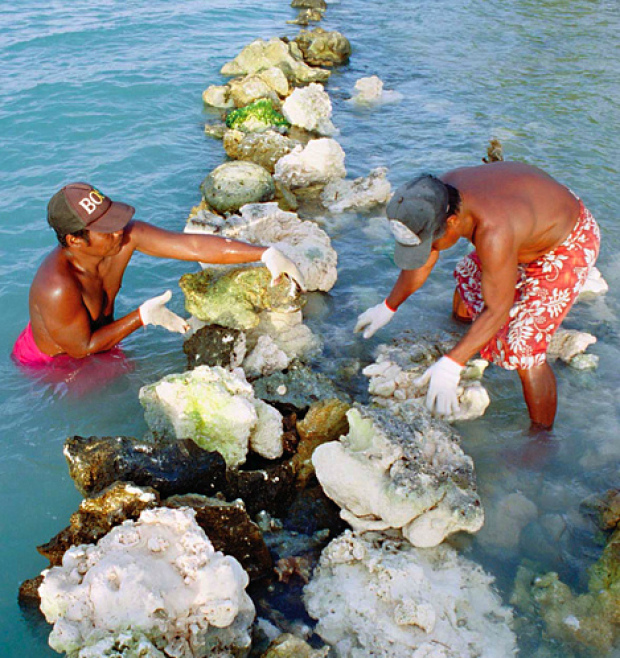The True Costs of Australia’s Election
Monday, October 21st, 2013

Constructing makeshift barriers out of coral rocks to break the swell of increasingly large tides in Kiribati.
Photo credit: UN ISDR
The President of the Republic of the Marshall Islands Christopher Jorebon Loeak spoke at Columbia University on September 25th on the consequences of climate change currently facing island nations like his own. Rising sea levels and increasingly unpredictable weather patterns pose a real threat to him and his country. But what does this have to do with Australia?
Australia’s new prime minister, Tony Abbott, was elected one week prior on September 18th. It was a critical election, with ramifications for international policy, as human rights and climate change were central to the national debate. Abbott played very effectively to Australians’ fears of paying a carbon tax and bearing the burden of a large influx of asylum seekers.
The first Abbott initiative is to “scrap the tax.” Abbott plans to repeal the 2012 carbon tax and replace it with the “Direct Action Plan,” a series of government subsidies and grants targeting renewables and energy efficiency. The estimated cost is 3.2 billion AUD over four years. While it still commits Australia to its greenhouse gas reduction target of 5% by 2020, it has become apparent that it is costly and economically inefficient.
Prime Minister Abbott’s second initiative is to “stop the boats.” The so-called “Operation Sovereign Borders” involves transporting and detaining intercepted asylum seekers to Australia’s north, immediately upon capture. As of 30 June 2013, over 13,108 individuals arriving on boats were intercepted and sent to Papua New Guinea or Nauru to be processed – a costly period of detention that some figures approximate to 71,000 AUD per detainee, or 2.9 billion AUD in total for the 2013-2014 fiscal year.
Further investigations revealed that about 90% of these detainees were eventually found to be genuine asylum seekers, fleeing from war or economically ravaged countries, like Iraq, Pakistan, Afghanistan, and Sri Lanka. They were then granted visas and permitted to settle in Australia, and accordingly, much of the 2.9 billion AUD spent in pursuit and detention was essentially wasted.
The financial burden of both initiatives falls squarely on the individual Australian taxpayer. With a population of twenty-three million, this implies that each Australian will be paying around 35 AUD annually for the Direct Action Plan until 2017 or 2018, and 126 AUD per Australian annually for Operation Sovereign Borders, if the present trend continues.
Each Australian is then paying nearly four times as much to detain asylum seekers as to combat climate change.
Human rights issues aside, what has become painstakingly clear is that there is a widespread misconception in the country on the actual present and future costs of these two initiatives.
Three days prior to Australia’s election, fifteen Pacific Islands’ nations leaders convened at the Pacific Islands Forum to sign the Majuro Declaration, a statement calling for urgent action against climate change. Their governments have already begun developing contingency plans for relocating their entire populations should their homelands become uninhabitable.
Excepting Australia, New Zealand, and Papua New Guinea, the Pacific Islands are home to over two million people, and it is speculated that within the next twenty years, rising sea levels will force them from their homelands.
Since Australia is the most prosperous nation in the region, it is likely that Australia will find itself responsible for taking in these climate refugees. This level of forced migration within the region will dwarf the current numbers of asylum seekers presently arriving on Australia’s northern shores.
A more serious and honest examination of the present and future costs of Australia’s policies today can help avoid this fate. This would allow us to base policy decisions not on slogans like “stop the boats” or “scrap the tax” but on objective facts, like how much the initiatives cost Australian taxpayers and which initiatives will guarantee the most benefits now and in the future.
We need this debate now, before the consequences of a devastatingly poor climate change initiative today translates into an even more costly refugee crisis in the future.
Author Biography
Benjamin Dean is a Master of International Affairs, 2014 candidate at SIPA. Prior to SIPA, he worked at the Organisation for Economic Cooperation and Development (OECD) in Paris, France. He also writes at blog.bennydean.com.

